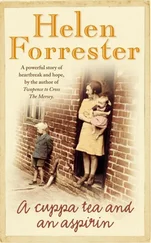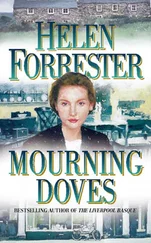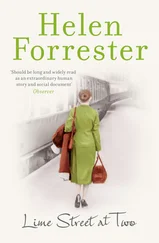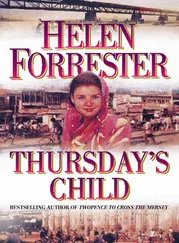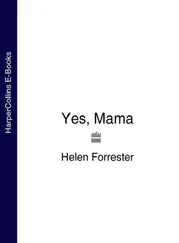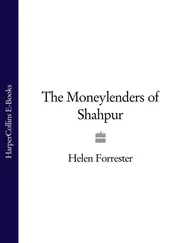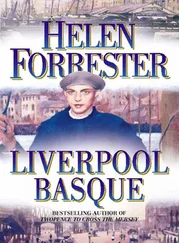Wrapped in her own sorrow while she grappled with the day-to-day problems of existence, she had not thought of such a situation before.
Seated in the train as it rumbled slowly into Euston, Barbara had queried mentally how careful, phlegmatic George might have faced coming home to a ruin – there had been bombs dropped close enough to the bed-and-breakfast for this to have been a possibility. And, in her self-searching, it dawned on her that she did not know; she really had not known him well enough to understand how his mind might have worked. And worst of all, now she would never know him any better – because he was gone.
As she walked towards George’s grave, she thought her heart would break. Because she did not want to cry in front of Jules, she held back the heaving sobs that rose within her. Instead, she clenched her teeth and walked blindly beside him.
Michel Benion, temporary taxi driver, ex-poultry farmer, slowly rolled up the front of his old black jersey and took his precious packet of cigarettes from inside his undershirt. Abstractedly he watched the little widow as she went with Jules to find the grave.
As he lit a cigarette and then sat down to wait on the step of the antiquated taxi, he felt again the well of pain and humiliation under which he himself still laboured.
It was ridiculous, he fretted in complete frustration, that nearly three years after the end of the war, because the Government had not yet cleared it of land mines, his chicken farm was still unworkable. In fact, the authorities, those mighty gods in Paris, were talking of buying the land from his family and making it into a park. Nearly three years – and they had still not made up their collective minds about it.
Just now, American money is being poured into Rouen and Le Havre where there are lots of voters, he fumed for the hundredth time. Simply because we are only small farmers with no clout, we can wait for ever, exactly like the farmers on the Western Front after the First World War.
And even if we got the farm back, would they lend us money to start again, build barns, buy breeding stock, sustain us financially until our flocks were rebuilt? What about our draught horse? Our cow, our pigs and vegetable garden that fed us?
Save as he and his mother did, in a desperate effort to collect a modicum of capital – living on little more than vegetable soup, bread and cheese, and occasional cigarettes when they could get them – he was beginning to realise that, alone, the family themselves could never acquire enough money to start again.
Of course, like most land in Normandy, their farm was owned jointly by all the members of the family: Michel’s sick brother, Anatole, their mother and their two married sisters in Rouen. It had been hard enough, even before the war, to scratch a living from two and a half hectares, when so many people held rights to it. It had meant intensive use of every inch of land.
Michel’s father had succeeded in buying out his own sea-going brother’s share, which feat had taken him most of his life to achieve; Michel doubted, however, that he would ever manage to buy out his own siblings’ shares, even under the best of circumstances.
And he had begun to ask himself whether he truly wanted to recommit his life to boundless hard work, just to stay alive and pay the rest of the family their share of what he managed to make. Would Anatole, perhaps, recover and be able to help him?
When their father had been alive, Anatole and his two sisters had, in addition to helping on the farm, all worked at other outside jobs and, with the extra money earned, the family had collectively managed quite well.
The girls were gone now, Anatole was very ill, and their mother had aged immeasurably during the ruthless occupation by the German Army. Michel knew he could not carry the burden of work alone; he would have to employ at least one labourer, a great expense when first starting up again, while for a time no money would be coming in.
Even if the Government bought the land to make a park, the resultant money would, after paying their debts, have to be divided between all the family members. Michel himself would still not have capital enough from his share to start a little business of any kind.
For the moment, his mother received an old age pension, and Anatole received a regular allowance and medical care because he was a very sick returned deportee who was being nursed at home. Without these, they would undoubtedly have starved, thought Michel gloomily.
But the value of the franc fell daily, and the cost of everything on the black market was, in consequence, rising formidably – and without the black market, which dealt in everything from bread to boots, they would be in desperate straits.
His mother and Anatole had refused to move further away from their land than Bayeux until a decision was made by the Government. Madame Benion had a fixed belief that if they did not remain close, someone would say the Benions were all dead and would try to claim it. ‘And what is a peasant without land?’ she had asked. ‘Just a body without a soul,’ Michel had fretted. Land was supposed to be the foundation of life.
In the meantime, he had worked for his Uncle Léon as a deckhand on his little coaster, and then had applied for all kinds of jobs in Bayeux in order to keep a roof over the family’s heads. But the only special skill he had was in raising hens – and cooking.
In refugee-filled, but undamaged Bayeux, there were very few jobs for the unskilled, so competition was keen for any work available.
If he could have persuaded his mother to move to the wreckage of Rouen, he could have easily found construction work. He would, he told himself, have cheerfully endured the pain in his shoulder, damaged since childhood, that heavy labour would have given him. But she woodenly refused. So, here he was, a taxi driver for old Duval, who owned the vehicle.
Duval had rented both driver and vehicle to three huge American Army officers for four months. The Americans were really civilian undertakers and were happily engaged in enjoying France, while they arranged for the bodies of their dead compatriots to be dug up and shipped home to the United States. The American Army had not seen fit to provide these civilian employees, even if they wore uniform, with transport; hence their use of the taxi.
Michel grinned slightly. At least, as far as he himself was concerned, the US Army was the soul of generosity. He was doing nicely on the side, ferrying to the local cemeteries people like the sad young English woman this afternoon – and the Americans had said quite blithely that it was OK for him to do so. He hoped old Duval would not wake up to this happy arrangement and demand a cut of whatever extra he earned.
Michel carefully blew a perfect smoke ring, and his thoughts reverted to the carnage on the chicken farm.
Four years earlier, when the hopes of liberation from the German occupation had run high, whispered about in every small café, the French had been filled with new hope. The reality of the cost of being set free had been unexpectedly brought home to the whole district with terrifying suddenness.
At the commencement of the Allies’ preliminary bombardment, many of the Benions’ neighbours fled inland. Unable to believe that French lives or French property would be destroyed, a number remained, including Michel, his mother, and his fiancée’s parents, whose plot abutted that of the Benions.
For a day or two, it seemed that the Benions’ choice had been correct. The attacks appeared to be directed at railway junctions and airports, the coast itself, and towards the destruction of the German Army and its likely escape routes.
While planes of every description flew over and occasionally fought pitched battles with each other above her head, Madame Benion remained determinedly calm. She fed her few remaining hens and collected some eggs, while Michel tended the vegetable garden, their frightened cow, and the squealing sow, which was about to farrow and was terrified by the noise of the diving planes.
Читать дальше


